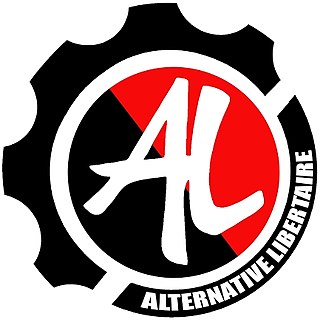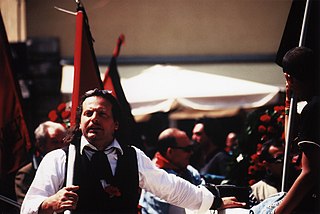Anarchist communism is a political philosophy and anarchist school of thought that advocates communism. It calls for the abolition of private property but retention of personal property and collectively-owned items, goods, and services. It supports social ownership of property and the distribution of resources "From each according to his ability, to each according to his needs".
Anarcho-syndicalism is a political philosophy and anarchist school of thought that views revolutionary industrial unionism or syndicalism as a method for workers in capitalist society to gain control of an economy and thus control influence in broader society. The goal of syndicalism is to abolish the wage system, regarding it as wage slavery. Anarcho-syndicalist theory generally focuses on the labour movement. Reflecting the anarchist philosophy from which it draws its primary inspiration, anarcho-syndicalism is centred on the idea that power corrupts and that any hierarchy that cannot be ethically justified must be dismantled.
The International Workers' Association – Asociación Internacional de los Trabajadores (IWA–AIT) is an international federation of anarcho-syndicalist labor unions and initiatives.

The Zabalaza Anarchist Communist Front, formerly known as the Zabalaza Anarchist Communist Federation (ZabFed), is a platformist–especifista anarchist political organisation in South Africa, based primarily in Johannesburg. The word zabalaza means "struggle" or "active rebellion" in isiZulu, isiXhosa, siSwati and isiNdebele. Initially, as ZabFed, it was a federation of pre-existing collectives, mainly in Soweto and Johannesburg. It is now a unitary organisation based on individual applications for membership, describing itself as a "federation of individuals". Historically the majority of members have been people of colour. Initially the ZACF had sections in both South Africa and Swaziland. The two sections were split in 2007, but the Swazi group faltered in 2008. Currently the ZACF also recruits in Zimbabwe. Members have experienced oppression in South Africa and Swaziland.
The Hague Congress was the fifth congress of the International Workingmen's Association (IWA), held from 2–7 September 1872 in The Hague, the Netherlands.

Alternative libertaire was a French anarchist organization formed in 1991 which publishes a monthly magazine, actively participates in a variety of social movements, and is a participant in the Anarkismo.net project. In 2019 the organization merged into the Union Communiste Libertaire
The Anarchist International of St. Imier was an international workers' organization formed in 1872 after the split in the First International between the anarchists and the Marxists. This followed the 'expulsions' of Mikhail Bakunin and James Guillaume from the First International at the Hague Congress. It attracted some affiliates of the First International, repudiated the Hague resolutions, and adopted a Bakuninist programme, and lasted until 1877.

The International Alliance of Socialist Democracy was an organisation founded by Mikhail Bakunin along with 79 other members on October 28, 1868, as an organisation within the International Workingmen's Association (IWA). The establishment of the Alliance as a section of the IWA was not accepted by the general council of the IWA because, according to the IWA statutes, international organisations were not allowed to join, since the IWA already fulfilled the role of an international organisation. The Alliance dissolved shortly afterwards and the former members instead joined their respective national sections of the IWA.

Anarchism in France can trace its roots to thinker Pierre-Joseph Proudhon, who grew up during the Restoration and was the first self-described anarchist. French anarchists fought in the Spanish Civil War as volunteers in the International Brigades. According to journalist Brian Doherty, "The number of people who subscribed to the anarchist movement's many publications was in the tens of thousands in France alone."
Italian anarchism as a movement began primarily from the influence of Mikhail Bakunin, Giuseppe Fanelli, and Errico Malatesta. Rooted in collectivist anarchism and social anarchism, it expanded to include illegalist individualist anarchism, mutualism, anarcho-syndicalism, and especially anarcho-communism. In fact, anarcho-communism first fully formed into its modern strain within the Italian section of the First International. Italian anarchism and anarchists participated in the biennio rosso and survived Italian Fascism. Platformism and insurrectionary anarchism were particularly common in Italian anarchism and continue to influence the movement today. The synthesist Italian Anarchist Federation appeared after the war, and autonomismo and operaismo especially influenced Italian anarchism in the second half of the 20th century.
Contemporary anarchism within the history of anarchism is the period of the anarchist movement continuing from the end of World War II and into the present. Since the last third of the 20th century, anarchists have been involved in anti-globalisation, peace, squatter and student protest movements. Anarchists have participated in armed revolutions such as in those that created the Makhnovshchina and Revolutionary Catalonia, and anarchist political organizations such as the International Workers' Association and the Industrial Workers of the World have existed since the 20th century. Within contemporary anarchism, the anti-capitalism of classical anarchism has remained prominent.
Alexander "Sanya" Moiseyevich Schapiro or Shapiro was a Russian anarcho-syndicalist activist. Born in southern Russia, Schapiro left Russia at an early age and spent most of his early activist years in London.

The Confederation of Revolutionary Anarcho-Syndicalists is the Russian section of the International Workers' Association (AIT). CRAS-IWA is committed to the development of anarchist trade union movement, so as to enable the transition from modern capitalism to statefree communism.

Rafael Farga i Pellicer was a Catalan anarcho-syndicalist who led the establishment of the Spanish Regional Federation of the IWA (FRE-AIT). As a print worker, he became involved in the Barcelona workers' movement following the Glorious Revolution of 1868, when he was first introduced to anarchism by the Italian anarchist Giuseppe Fanelli. He then set about organising the Catalan workers' movement along anarchist lines, emphasising decentralisation and federalism, eventually affiliating the FRE-AIT with Mikhail Bakunin's Anti-Authoritarian International. He then came to uphold the precepts of anarcho-syndicalism, overseeing the establishment of the FRE-AIT's successor, the Federation of Workers of the Spanish Region (FTRE). Later in life, he lost interest in syndicalist organising and turned to journalism, penning a series of studies of political figures and movements of the 19th century.

The International Workingmen's Association (IWA), often called the First International (1864–1876), was an international organisation which aimed at uniting a variety of different left-wing socialist, social democratic, communist and anarchist groups and trade unions that were based on the working class and class struggle. It was founded in 1864 in a workmen's meeting held in St. Martin's Hall, London. Its first congress was held in 1866 in Geneva.
Anarchism emerged on territories of Serbia in the second half of the 19th century as part of the wider workers' movement in the Southern Slavic and future Yugoslavian region, and was embraced along with other freedom-centered ideas as part of the struggle for national liberation from Austria-Hungary and the Ottoman Empire. Among the first people to espouse ideas of Pierre-Joseph Proudhon was Živojin Žujović, who was at the time a student of law and economy, later credited as the first Serbian socialist. A sizeable community of South Slavic students and revolutionaries was based in Switzerland, where they kept in touch with Mikhail Bakunin and the Slavic section of Jura Federation.
Anarchism in Bulgaria first appeared in the 1860s, within the national movement seeking independence from the Ottoman Empire, strongly influenced by the Russian revolutionary movement. Anarchism established itself as a distinct political movement at the end of the 19th century. It developed further in the 20th century, so much so that Bulgaria was one of the few countries in Eastern Europe where the organized anarchist movement enjoyed a real establishment throughout the country, until the seizure of power by the Bulgarian Communist Party. Under the People's Republic of Bulgaria, the anarchist movement survived underground, but was the victim of severe repression. From 1989, anarchism has been freely reconstituted.

The Spanish Regional Federation of the International Workingmen's Association, known by its Spanish abbreviation FRE-AIT, was the Spanish chapter of the socialist working class organization commonly known today as the First International. The FRE-AIT was active between 1870 and 1881 and was influential not only in the labour movement of Spain, but also in the emerging global anarchist school of thought.
Anarchism in Switzerland appeared, as a political current, within the Jura Federation of the International Workingmen's Association (IWA), under the influence of Mikhail Bakunin and Swiss libertarian activists such as James Guillaume and Adhémar Schwitzguébel. Swiss anarchism subsequently evolved alongside the nascent social democratic movement and participated in the local opposition to fascism during the interwar period. The contemporary Swiss anarchist movement then grew into a number of militant groups, libertarian socialist organizations and squats.
Anarchism in Austria first developed from the anarchist segments of the International Workingmen's Association (IWA), eventually growing into a nationwide anarcho-syndicalist movement that reached its height during the 1920s. Following the institution of fascism in Austria and the subsequent war, the anarchist movement was slow to recover, eventually reconstituting anarcho-syndicalism by the 1990s.







